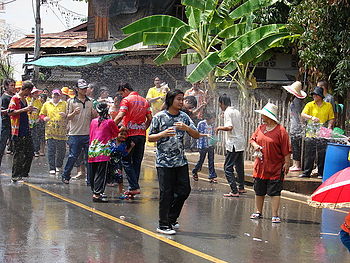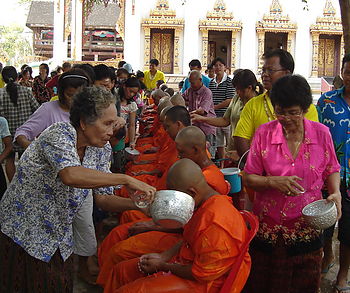Songkran
Songkran (from Sanskrit sankranti meaning "astrological passage") is the Thai New Year.
It is celebrated every year from the 13th to 15th of April.
How to greet person on Songkran? Most people say "suk-san wan sonkran" or "Happy Songkran Day".
 Songkran
Songkran
Nowadays the most popular way of celebrating Songkran is the throwing of water. People go from street to street carrying various water guns or water containers.
Some just stay along the road with a garden hose and drench each other or everyone who passes by.
What's the origin of throwing water? It is a way of showing respect to people. To put little bit of water on other's hands or over a shoulder is a sign of respect.
The fact that April is the hottest month of the year in Thailand partly influence the huge amount of water being thrown on Songkran.
 Songkran in wat
Songkran in wat
People traditionally visit older family members, friends and neighbours. Many individuals go to a wat (Buddhist monastery) too. In the wat people pray and give food to monks.
On Sonkran people clean images of Buddha in house shrines but also those in monasteries by pouring little bit of water mixed with a Thai fragrance on them.
Doing so should bring good luck and prosperous New Year. Beside cleaning images of Buddha some people also do big cleaning of their homes.
In city of Chiang Mai, located in northern Thailand, pictures of Buddha from all monasteries are presented in a parade through the city streets.
People standing along streets ritually "bath" the images by tossing water at them.
Northern Thailand has one more interesting traditions performed on Sonkran.
A person carries handful of sand to the nearby monastery. That way the person gives sort of compensation for the dirt he/she has carried away on feet during the year.
Sand brought by the people is put on piles which are decorated with colourful flags.
Finally, it has to be mentioned that Songkran is not only present in Thailand.
It is also present in Laos ("pi ma lao"), Cambodia ("Chaul Chnam Thmey"), Myanmar ("Thingyan") and among the Dai people in Yunan region located in the southwest of China
Many calendars used in South Asia also mention Songkran. For example, in Bengali calendar it is called "Pohela Boishakh".